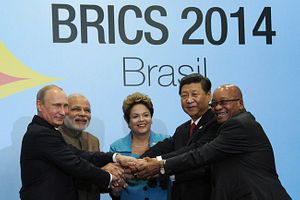It’s become a cliché to ask if China intends to change the rules of the current international system. Ask any American official or scholar, the answer would probably be something like this: “Yes, and it is very concerning to American global leadership.” Ask a Chinese official or scholar, though, and the answer would be less abrupt – the Chinese might first try to explain that China does not intend to challenge the current international system, yet it seeks reforms (for example in international financial institutions).
These seemingly contradictory responses point us to a deeper question, one that we’re aware of but often choose to overlook: Should the current international rules be changed?
Some have constantly discredited, questioned, and even censured China for the perceived threat it poses to the current international rules, all without asking the question above. But isn’t this a more substantial question with regard to the changing world situation?
We shouldn’t get tangled in the “chicken or egg” question of which came first: China’s initiatives to reform the current international rules or the appearance of problems with the existing international rules. It’s enough to note that the current international rules can hardly be said to best serve the ever-changing international situation when it comes to a number of issues, from international financial reform to eliminating imbalances in regional development.
An abundance of evidence (including UN documents, Chinese government reports, and other international academic resources) show that since 1960s, China’s attitude toward the international system and the existing rules has changed. Today, China seeks more participation and, of course, more reforms. However, reality proves how difficult it is to initiate substantial reforms to the current international rules (especially the international financial rules), which have existed for over 70 years.
It’s become fashionable to simplify the U.S.-China dynamic as the incumbent dominant power (a status quo power) facing challenges from a rapidly emerging power (a revisionist power). There is truth to this, but such an explanation simplifies the real situation. Most importantly, it brushes aside the fundamental question of whether the current rules are perfect and/or should be left perpetually unchanged.
In fact, to date China’s behavior proved that it does not intend to completely overthrow the current international system (in which it has been a beneficiary). Rather it seeks more room for cooperation and reforms. The opening and inclusive attitude of the Chinese-led Asian Infrastructure Investment Bank more or less proves this. After all, China only founded the AIIB after it became clear reforms to existing financial institutions weren’t making any progress.
Rules are born of practices, and practices take place in an ever-changing international situation. Practice is fluid by necessity, but the rules have become fixed and unchangeable. In today’s world, China is a rising power, but international rules have yet to change to keep up with this reality.
Like it or not, China’s rise cannot be delayed or even sabotaged (although China indeed needs to seriously focus more on its soft power and the quality of its economic growth, rather than overly demonstrating its ever-growing confidence or assertiveness). Hence, empowerment and cooperation in the international system are more reasonable and constructive than counter-balancing and containment — at least for anyone truly interested in playing a win-win game.

































